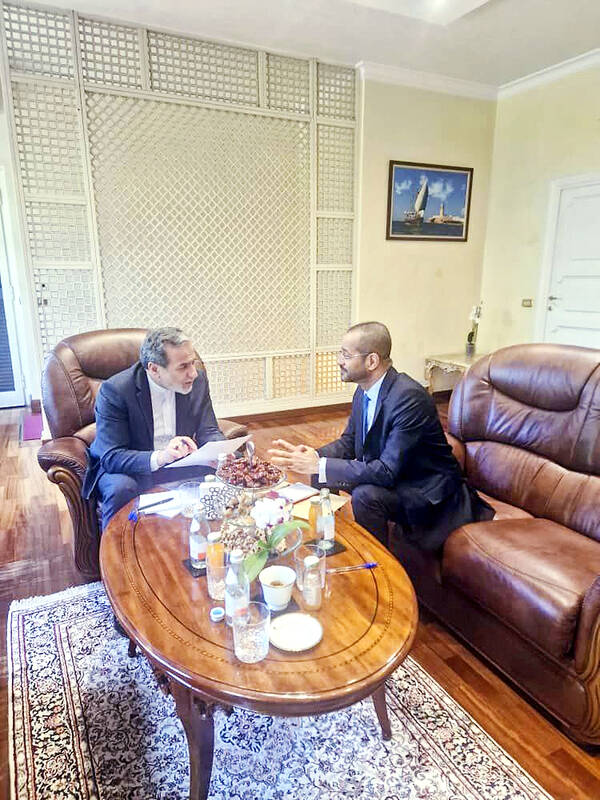Iran’s foreign minister described nuclear talks with the US as “complicated,” following the conclusion of a fifth round of discussions in Rome on Friday.
The talks, which began last month, are the highest-level contact between the foes since the US quit a landmark 2015 nuclear accord during US President Donald Trump’s first term.
Since returning to office, Trump has revived his “maximum pressure” campaign on Iran, backing talks, but warning of military action if diplomacy fails

Photo: AP
Iran wants a new deal that would ease the sanctions, which have battered its economy.
“The negotiations are too complicated to be resolved in two or three meetings,” Iranian Minister of Foreign Affairs and lead negotiator Abbas Araghchi said, as the Oman-mediated talks concluded.
A senior US official described the talks as “constructive” and said the two sides agreed to meet again.
“The discussions were both direct and indirect, and lasted over two hours. The talks continue to be constructive — we made further progress, but there is still work to be done,” the official said.
Omani Minister of Foreign Affairs Badr al-Busaidi wrote on X that the fifth round concluded “with some but not conclusive progress,” adding that he hoped “the remaining issues” would be clarified in the coming days.
Iranian Ministry of Foreign Affairs spokesman Esmaeil Baqaei had earlier said that chief US negotiator Steve Witkoff had left the talks “due to his flight schedule.”
The fourth round of talks, in the Omani capital Muscat, ended with a public spat over enrichment.
Witkoff said Washington “could not authorize even one percent” enrichment — a position Tehran called a red line, citing its rights under the nuclear Non-Proliferation Treaty.
Ahead of Friday’s talks, Araghchi said “fundamental differences” remained with the US, while adding that Tehran was open to its nuclear sites undergoing more inspections.
“We will not have an agreement at all” if the US wants to prevent Iran from enriching uranium, he said.
Analysts in Tehran said Iran was unlikely to back down.
“It’s quite simple; if the US expects Iran to halt nuclear enrichment, then there can’t be a deal,” said University of Tehran professor Mohammad Marandi, who was once an adviser on the nuclear issue.
The Atomic Energy Organization of Iran said the country’s nuclear industry employs 17,000 people, similar to other countries where uranium is enriched for civilian use.
“The Netherlands, Belgium, South Korea, Brazil and Japan enrich [uranium] without possessing nuclear weapons,” its spokesman Behrouz Kamalvandi said.
Iran’s enmity with Israel has been a constant backdrop to the talks.
In a letter to the UN, Araghchi wrote: “We believe that in the event of any attack on the nuclear facilities of the Islamic Republic of Iran by the Zionist regime, the US government will also be involved and bear legal responsibility.” The warning came after CNN, citing unnamed US officials, reported Israel was making preparations to carry out such a strike.
The White House said Trump had a “productive discussion” with Israeli Prime Minister Benjamin Netanyahu on Thursday about Iran and the fatal shooting of two Israeli embassy staff in Washington.